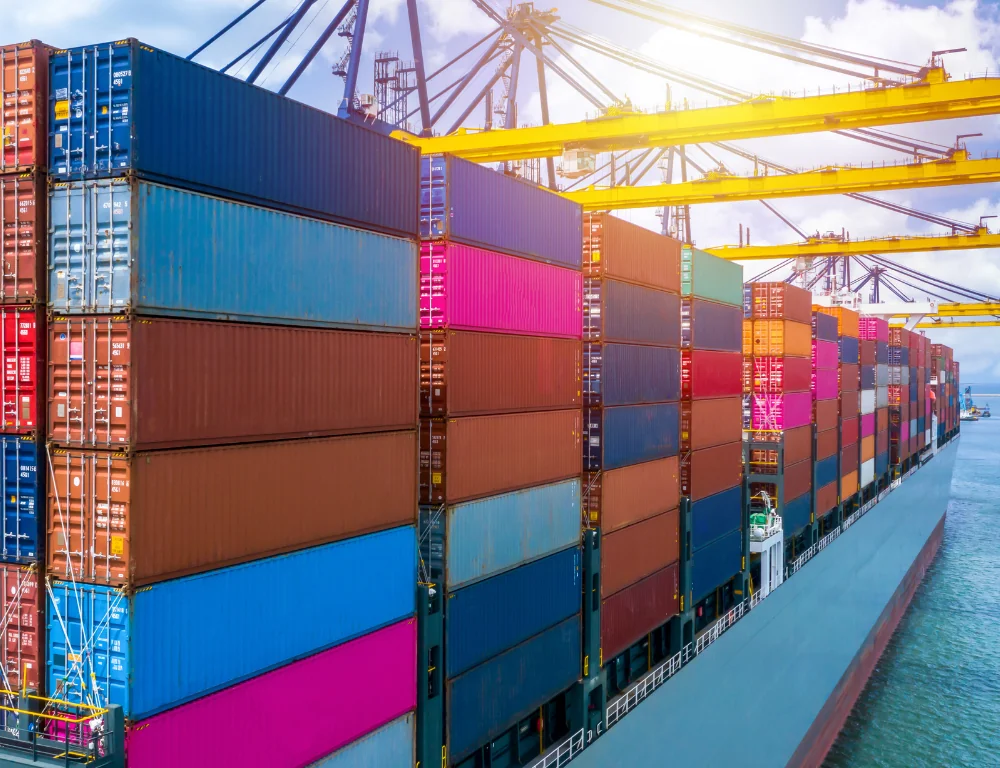
Interstate Freight
Explore the challenges, opportunities, and innovations shaping interstate freight transportation.
Freight transportation plays a pivotal role in the global economy. It facilitates the movement of goods across vast distances and connects producers with consumers worldwide.
Whether by road, rail, air, or sea, freight logistics networks form the backbone of modern supply chains, enabling businesses to access raw materials, distribute finished products, and serve diverse markets. However, the freight industry faces many challenges, including infrastructure constraints, regulatory complexities, and environmental concerns.
At the same time, technological advancements and sustainable practices offer opportunities to enhance efficiency, resilience, and sustainability in freight transportation. In this discourse, we will explore the key considerations, emerging trends, and innovative solutions shaping the landscape of interstate freight logistics.
We provide competitive freight shipping prices and an all-inclusive, easy-to-use shipping experience for our customers. Exceeding our customers’ expectations results in thousands of satisfied customer reviews and repeat business. We believe in the power of our customer relationships. Check out FreightCenter reviews from real customers, and learn what they have to say about their freight shipping experience!
- 2021, 2017 & 2016 Food Logistics’ Top Green Providers
- 2021 & 2018 Supply & Demand Chain Executives’ Pros to Know: Matthew Brosious
- 2020 & 2019 Top Food Logistics’ 3PL & Cold Storage Provider Award
- 2020 & 2019 Business Observer’s Top 500 Companies on the Gulf Coast
- 2020 & 2017 SmartWay® Transport Partner
- 2020 & 2017 Food Logistics’ Champions: Rock Stars of the Supply Chain
- 2020 Best of Palm Harbor Awards for Local Businesses
- 2017 Green Supply Chain Award from Supply & Demand Chain Executive
- 2017 Tampa Bay Business Journal Heroes at Work
- 2016, 2015, & 2012 Food Logistics Top 100 Software and Technology Providers
- 2013 Tampa Bay Business 100 by Tampa Bay Business Journal
- 2013 Top 100 Great Supply Chain Partners by SupplyChainBrain
- 2012 TIA Samaritan Award Honorable Mention
- 2012, 2011 & 2010 TBBJ Fast 50 Recipient
- 2013, 2011, & 2010 Diversity Business Top Businesses

Choosing FreightCenter for Interstate Shipping
FreightCenter offers several advantages for interstate shipping that make it a compelling choice for businesses and individuals:
- Convenience: FreightCenter provides a one-stop platform to compare rates from multiple carriers, book shipments, track deliveries, and manage all aspects of your shipping needs. This convenience saves time and effort compared to contacting individual carriers separately.
- Cost-Effective Solutions: FreightCenter leverages its network of carriers to negotiate competitive rates, allowing customers to access discounted shipping prices. You can choose the most cost-effective option for your specific needs by comparing rates from different carriers.
- Wide Range of Services: FreightCenter offers various shipping services to accommodate different types of freight, including less-than-truckload (LTL), full truckload (FTL), air freight, and international shipping. Whether you’re shipping small packages or large, bulky items, FreightCenter has a solution.
- Expert Guidance: FreightCenter’s team of shipping experts is available to provide personalized assistance and guidance throughout the shipping process. Whether you have questions about packaging, documentation, or transit times, their knowledgeable staff is there to help.
- Technology Platform: FreightCenter’s user-friendly online platform makes it easy to book and manage shipments from anywhere, at any time. With features like instant quotes, online booking, and real-time tracking, you have full visibility and control over your shipments.
- Reliability and Trustworthiness: With over 20 years of experience in the industry, FreightCenter has established itself as a trusted logistics provider. They work with reputable carriers and prioritize customer satisfaction, ensuring that your shipments are handled with care and delivered on time.
Choosing FreightCenter for interstate shipping provides convenience, cost savings, and peace of mind, making it an excellent option for businesses and individuals alike.
Documentation Needed for Interstate Freight Shipping
Shipping freight across state lines involves specific documentation crucial for ensuring smooth operations and compliance with regulations. The key document you’ll need is the Bill of Lading (BOL).
This is a legal contract between the shipper and the carrier. It lists what’s being shipped, where it’s going, and the conditions under which it’s transported. The BOL acts as a receipt of goods, provides evidence of the contract of carriage, and outlines the details necessary for billing.
Another essential document is the Commercial Invoice. This invoice details the transaction between the buyer and seller. It includes a description of the goods, their value, and the terms of sale.
Accurately describing the contents and value of interstate shipments is essential to ensure proper handling and compliance with regulations.
A Packing List is also essential. This list details all the items included in the shipment and their packaging. The carrier uses it to verify the shipment’s contents and ensure everything is accounted for. This document helps avoid disputes by clearly recording what was shipped.
You might also need a Certificate of Origin. This certificate states where the goods were made and can be necessary for specific products or destinations.
It helps determine if the goods qualify for preferential treatment under trade agreements.
Additionally, some shipments require specific Permits or Licenses depending on what you’re shipping and where you might need particular permission.
For example, hazardous materials or oversized loads often require special permits. It’s essential to check with state and federal regulations to ensure compliance.
Determining the Best Mode of Transportation for My Shipment
As a shipper, your role in choosing the right mode of transportation for your freight is crucial. This decision can significantly impact the cost, speed, and safety of your shipment.
The choice depends on several factors: cost, speed, distance, and the nature of the goods. Here are the main options to consider:
1. Truck Freight: This is the most common mode for interstate shipping. Trucks are flexible and can reach nearly any location. They’re great for short to medium distances and can handle various goods.
The cost is usually moderate but can increase with fuel prices and additional services like liftgate delivery.
2. Rail Freight: Rail is an efficient and cost-effective option for large, heavy shipments over long distances. It’s perfect for bulk commodities like coal, lumber, and grain.
While it’s slower than trucking, it can be more economical for large volumes and less impacted by traffic and weather conditions.
3. Air Freight: If speed is your priority, air freight is the fastest option. It’s ideal for time-sensitive or high-value goods. However, it’s also the most expensive mode of transportation.
Air freight is usually used for lightweight, high-value items or urgent shipments.
4. Sea Freight: While interstate shipping within the continental U.S. is rare, sea freight is used for large, heavy shipments traveling long distances.
It’s the slowest but also the most economical for bulk goods. It’s mainly used for international shipping but can be part of an interstate route involving ports.
When choosing a mode of transport, it’s crucial to consider the nature of your goods, the distance, and the delivery timeline. This thoughtful consideration ensures the most cost-effective and efficient shipping.
For instance, perishable items need fast, refrigerated transport, while bulky goods are better suited for rail or sea. Also, consider the distance and delivery timeline.
If you need the goods quickly, air might be the best option despite the higher cost. For less urgent shipments, rail or truck can be more cost-effective.
Costs Associated with Interstate Freight Shipping
Understanding the costs involved in interstate freight shipping is crucial for budgeting and planning. Here are the primary costs you’ll encounter:
1. Base Freight Charges: This is the core cost of shipping your goods from one place to another. It’s usually calculated based on the weight and volume of your shipment, the distance traveled, and the mode of transportation.
Different carriers have different rate structures, so getting quotes from several providers is a good idea.
2. Fuel Surcharges: Fuel prices fluctuate, and many carriers add a fuel surcharge to cover these changes. This surcharge is typically a percentage of the base freight charge and varies depending on fuel prices.
3. Accessorial Charges: Additional fees for extra services beyond the primary transportation. Standard accessorial charges include:
– Liftgate Service: If your delivery location doesn’t have a loading dock, you might need a truck with a liftgate to unload your shipment.
– Residential Delivery: Delivering to a home rather than a business can incur extra fees because it often requires special handling and smaller trucks.
– Inside Delivery: If the driver needs to bring the goods inside rather than drop them off at the curb, there might be an additional charge.
– Reweighing Fees: If the carrier needs to verify the weight of your shipment, they might charge a fee for reweighing it.
4. Insurance: While carriers typically offer some liability coverage, more is needed to cover the total value of your goods. Purchasing additional insurance ensures you’re covered in case of loss or damage.
The insurance cost varies based on the goods’ value and the coverage level you choose.
5. Customs and Duties: Shipments crossing international borders might incur customs duties and taxes.
Although this doesn’t typically apply to interstate shipping within the U.S., it’s something to be aware of if your shipment has a component that crosses international lines.
6. Storage Fees: Storage fees can apply if your shipment needs to be stored temporarily at the origin or destination. These fees vary depending on the duration and the facilities used.
Understanding these costs and planning accordingly can help you manage your shipping budget effectively.
It’s always a good idea to ask carriers for a detailed breakdown of their charges and compare quotes from multiple providers to ensure you’re getting the best deal.
Ensuring Proper Packaging and Labeling for My Shipment
Proper packaging and labeling are crucial to ensuring your shipment arrives safely and in good condition. Here’s what you need to know:
1. Choosing the Right Packaging Materials: The first step is selecting the appropriate materials to protect your goods. Depending on what you’re shipping, you might need:
Corrugated Boxes are sturdy and come in various sizes. They’re ideal for most types of goods.
– Pallets: Pallets can help handle and transport heavier or bulkier items.
– Crates: Wooden or plastic crates provide extra protection for fragile or high-value items.
– Cushioning Materials: Bubble wrap, foam peanuts, and air pillows can help prevent damage from impacts during transit.
2. Packaging Techniques: Proper techniques ensure the safety of your goods:
– Securing Items: Use cushioning materials to fill empty spaces in the box. This prevents items from shifting during transit.
Sealing Boxes: Use strong packing tape to seal boxes securely. If the box is heavy, reinforce the bottom and top seams with extra tape.
– Stacking on Pallets: If you use pallets, stack boxes evenly and avoid overhanging edges. Use shrink wrap to secure the entire load to the pallet.
3. Labeling Requirements: Correct labeling is essential for proper handling and delivery:
– Shipping Labels: Include the destination address, return address, and special handling instructions. Make sure labels are clear and easy to read.
– Fragile Labels: If your items are delicate, use “Fragile” labels to indicate they need careful handling.
– Hazardous Materials: If you’re shipping hazardous materials, you must label them according to regulations. This includes specific symbols and information about the hazards.
– Barcodes: Many carriers use barcode labels to track shipments. Ensure these are placed where they’re easily scannable.
4. Special Considerations for Different Types of Goods
– Perishable Items require refrigerated packaging and labeling to indicate temperature requirements.
– Electronics: Use anti-static packaging and padding to protect against shocks and electrostatic discharge.
– Liquids: Ensure they’re in leak-proof containers and label them to indicate they contain liquids.
By following these guidelines, you can minimize the risk of damage and ensure your shipment is handled correctly throughout the transportation process.
To create value for our customers by delivering customized shipping solutions that meet their unique needs and to fulfill shipping demands from simple to complex with expertise, guidance and ingenuity.
Rail shipping is a cost-effective and environmentally friendly transportation method that utilizes trains to move goods over long distances. It's known for its efficiency in handling large volumes of cargo, making it a sustainable and economical choice for businesses seeking reliable freight transport options.
Expedited shipping is a premium service designed to meet urgent delivery needs. It prioritizes speed and quick turnaround, ensuring that packages or goods reach their destination faster than standard shipping options. Expedited shipping is the go-to choice when time-sensitive deliveries are essential, providing businesses and individuals with reliable and prompt service for critical shipments.
White glove shipping is a premium service that goes beyond standard delivery, offering meticulous handling, specialized packaging, and in-home setup or installation for valuable or delicate items, ensuring a seamless and hassle-free experience for customers.
Less than truckload (LTL) shipping is a smart logistics solution for businesses with smaller shipments. It combines multiple smaller shipments into a single truckload, optimizing space and reducing costs. LTL shipping offers affordability and efficiency while ensuring timely delivery, making it an ideal choice for companies looking to save on transportation expenses without compromising on service quality.


Factors for Choosing FreightCenter for Interstate Shipping
- Convenience and Efficiency:
- Comparison of rates from multiple carriers on a single platform saves time and effort.
- Simplified booking process and centralized management of shipments.
- Cost-Effectiveness:
- Access to discounted shipping rates through FreightCenter’s negotiated agreements with carriers.
- Ability to compare rates and choose the most economical shipping option.
- Variety of Services:
- Availability of a wide range of shipping services, including LTL, FTL, air freight, and international shipping.
- Flexibility to accommodate shipments of varying sizes and types.
- Expert Guidance and Support:
- Access to knowledgeable shipping experts for personalized assistance and guidance.
- Assistance with packaging, documentation, and navigating the shipping process.
- Technology Platform:
- User-friendly online platform with features like instant quotes, online booking, and real-time tracking.
- Accessibility from anywhere, at any time, for seamless management of shipments.
- Reliability and Trustworthiness:
- Reputation built on over 20 years of experience in the industry.
- Partnerships with reputable carriers and commitment to customer satisfaction.
Considering these factors can help individuals and businesses make an informed decision when choosing FreightCenter for their interstate shipping needs.
Interstate Freight FAQ


Q. How do I know if my shipment is eligible for interstate freight shipping?
If you’re shipping goods from one state to another within the United States, you’re likely eligible for interstate freight shipping.
Q. What are the weight and size limits for my shipment?
Weight and size limits vary by carrier and mode of transportation. Check with your carrier for specific guidelines.
Q. How do I calculate shipping costs for my freight?
Shipping costs depend on factors like weight, distance, and mode of transportation. Get quotes from carriers to estimate your costs.
Q. What should I do if my shipment is damaged or lost?
Contact your carrier immediately to file a claim. Provide documentation and evidence of the damage or loss.
Q. How can I track my shipment?
Most carriers offer online tracking tools where you can enter your tracking number to see the status of your shipment.
Q. What happens if my shipment is delayed?
Delays can happen due to various reasons. Contact your carrier for updates and information on when your shipment will arrive.
Q. Can I insure my shipment?
Yes, you can purchase insurance to protect your shipment from loss or damage during transit. Check with your carrier or a third-party insurer for options.
Q. How do I schedule a pickup for my shipment?
Contact your carrier to schedule a pickup. Provide details about the shipment, including the pickup location and preferred pickup time.
Q. Can I ship hazardous materials interstate?
Yes, but you’ll need to follow specific regulations and guidelines for shipping hazardous materials. Check with your carrier for requirements.
Q. What should I do if I need to change or cancel my shipment?
Contact your carrier as soon as possible to make changes or cancel your shipment. Be aware that there may be fees involved.
Advantages of Interstate Freight Shipping

Wider Market Reach
Shipping goods interstate allows businesses to access customers in different states, expanding their market reach and potential customer base.

Cost Efficiency
Interstate freight shipping can be cost-effective, especially for large shipments or long distances, compared to other modes of transportation like air freight.

Flexible Options
With various modes of transportation available for interstate shipping, businesses can choose the option that best suits their needs in terms of speed, cost, and handling requirements.
